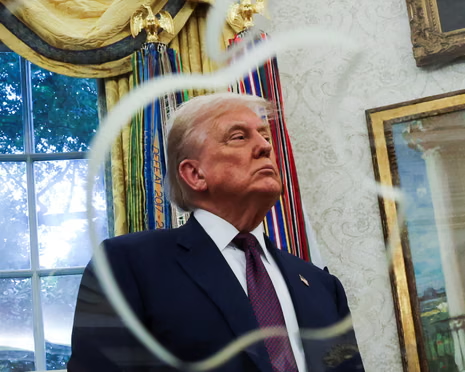In a recent campaign speech, former U.S. President Donald Trump announced he would impose 100% tariffs on semiconductors and computer chips made in China if he wins the 2024 election. This bold statement has already sparked global discussions around trade, technology, national security, and economic stability.
What Are Semiconductors and Why Do They Matter?
Semiconductors, often called “chips,” are the brains behind nearly every modern electronic device. They power smartphones, laptops, vehicles, smart appliances, military systems, and even healthcare equipment. Without them, the modern digital world would stop functioning.
Semiconductors are not just products; they are critical assets that define a country’s ability to lead in technology, economy, and defense.
Trump’s Call for 100% Tariffs on Semiconductors: What Did He Say?
In his speech, Trump said:
“If I’m elected, the United States will impose a 100% tariff on every semiconductor and chip that comes from China. We will bring manufacturing back home and end our dependence on a country that doesn’t respect us.”
This strong position follows his long-standing criticism of China and his push for economic nationalism — the belief that the U.S. should focus on domestic production and reduce foreign dependence.
Why Is Trump Pushing for These Tariffs?
Trump’s reasoning is based on three major points:
1. National Security
Trump and many of his allies argue that relying on China for critical technology parts like chips poses a serious national security threat. They believe China could exploit this dependency during conflicts or disputes.
2. Bringing Jobs Back to America
Trump believes these tariffs would force tech companies to move manufacturing jobs back to the U.S., especially in areas like Arizona and Ohio where new chip plants are being built.
3. Trade Imbalance with China
The U.S. imports billions of dollars worth of chips and electronic goods from China. Trump argues that these 100% tariffs would reduce the trade deficit and promote fairer trade.
How Would 100% Tariffs on Semiconductors Affect the Economy?
If implemented, Trump’s 100% tariffs on semiconductors would have wide-reaching effects — some potentially beneficial, others possibly damaging.
Higher Prices for Consumers
- Electronics could become more expensive.
- Smartphones, laptops, gaming consoles, and even cars may see price hikes.
- Consumers might bear the cost of tariffs as companies pass it down the supply chain.
Tech Industry Disruption
- U.S. tech companies depend on Chinese-made chips for production.
- Sudden tariffs could lead to supply chain chaos, production delays, and uncertainty.
- Smaller tech businesses may suffer the most, lacking resources to adapt.
Inflation Pressure
- New tariffs might contribute to inflation by raising the cost of goods.
- This could affect everyday essentials that rely on electronics — from kitchen appliances to medical devices.
Push to Diversify Manufacturing
On the flip side, this move might accelerate the U.S.’s long-term goal of building chip factories domestically. It could also encourage more investment in countries like Taiwan, South Korea, and India to reduce reliance on China.
How Does This Compare to Biden’s Policy?
President Joe Biden has also taken steps to reduce reliance on China, but his approach is different.
- In 2022, Biden signed the CHIPS and Science Act, offering over $50 billion in subsidies for domestic chip manufacturing.
- Biden’s administration has focused on incentives and partnerships rather than heavy tariffs.
So, while both leaders recognize the strategic importance of semiconductors, Trump’s plan is more aggressive, relying on tariffs and penalties, while Biden’s focuses on funding and cooperation.
What Are the Risks of Trump’s Tariff Plan?

Trade War Escalation
A 100% tariff could trigger retaliation from China, leading to a new trade war. This may affect other U.S. exports like agriculture, automotive, and energy.
Global Tensions
China is the world’s second-largest economy. Harsh measures like these could strain diplomatic relations and disrupt global markets.
Technology Slowdown
If the supply chain is severely impacted, it may slow down innovation in AI, electric vehicles, cloud computing, and advanced robotics.
What Experts Are Saying
Supporters of the Plan
Many Republican leaders and business advocates who support reshoring believe the move will:
- Create high-paying American jobs
- Reduce geopolitical risk
- Strengthen the U.S. tech base
“We can’t let a foreign government control the building blocks of our future. Bringing chip production home is long overdue.” — GOP Senator
Critics of the Plan
Economists and tech industry leaders warn of serious drawbacks:
- Short-term price shocks
- Global instability
- Risk of hurting U.S. tech firms
“100% tariffs will punish American consumers more than anyone else,” said a leading economist. “We need to be strategic, not reactionary.”
Will This Policy Really Work?
It depends on how you define “working.”
If the goal is to punish China and reduce dependence on foreign-made chips, it may partially succeed — but at a high cost.
If the goal is to quickly boost domestic production, it’s less certain. Building a chip factory takes years and billions of dollars.
Even Intel, one of America’s biggest chipmakers, has said that reshoring is not easy and requires global cooperation, not isolation.
How Could This Affect the 2024 Election?
Trump’s bold move plays well with voters who:
- Believe China is a major threat
- Want more American jobs
- Support protectionist trade policies
But it may alienate voters who:
- Are worried about rising costs
- Depend on tech for small businesses or education
- Favor global trade and diplomacy
Tech industry professionals, especially in Silicon Valley, have voiced strong opposition to the idea.
Possible Alternatives to 100% Tariffs
Even without extreme tariffs, the U.S. has other tools to reduce reliance on China:
- Subsidizing domestic chipmakers
- Tax breaks for companies building U.S. fabs
- International alliances with friendly nations like Japan, Taiwan, and India
- Strategic export controls on advanced tech
These alternatives may offer a balanced path forward — enhancing national security without damaging global ties or increasing costs for Americans.
Final Thoughts: A High-Stakes Bet
Trump’s proposal for 100% tariffs on semiconductors and chips is one of the most aggressive trade policies in modern history. It touches every part of the economy — from smartphones to satellites.
While the idea of bringing manufacturing back to America resonates with many, the road to achieving it is long, expensive, and complex. For now, it’s a bold campaign promise. But if he wins, the world — especially China — will be watching closely.
The future of tech, trade, and innovation may depend on how the U.S. handles this issue. Whether it’s Trump’s tough stance or Biden’s investment-driven approach, one thing is clear: semiconductors are now at the center of global power.
Do Follow USA Glory On Instagram
Read Next – Trump’s Approval Rating Dips in New Poll: What Recent Surveys Show






